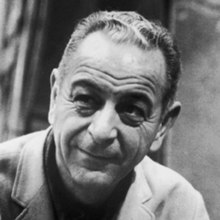 Burton Lane, Broadway and Hollywood composer and sometime lyricist, in conversation with Richard Wolinsky, August 17, 1992 in New York.
Burton Lane, Broadway and Hollywood composer and sometime lyricist, in conversation with Richard Wolinsky, August 17, 1992 in New York.
Burton Lane, who died at the age of 84 in 1997, was best known for composing the scores for the hit Broadway shows Finian’s Rainbow (with E.Y. (Yip) Harburg) and On A Clear Day You Can See Forever (with Alan J. Lerner). As a teenager, he was considered a protégé of George Gershwin, and was close to the Gershwin family until he moved to Los Angeles to compose songs for a variety of different musicals, including the Fred Astaire film, Royal Wedding . His other Broadway show, Carmelina, was produced in 1979.
In 1992, after creating a radio documentary about Leonard Bernstein,Richard Wolinsky embarked on another documentary on the life and music of George Gershwin, which started with a Morning Concert program featuring Ira Gershwin’s nephew Michael Strunsky and Gershwin expert Deena Rosenberg. That was followed followed with interviews with Michael’s father English Strunsky, with Ira Gershwin’s archivist, later a noted cabaret performer, Michael Feinstein, and New York Grande Dame Kitty Carlisle, who dated George Gershwin in the 1930s. This interview as the fifth of seven interviews, after which for personal reasons, the project was abandoned.
Burton Lane’s dreams of a new Broadway show never reached fruition, and he died at the age of 84 five years after the interview. However, three songs he wrote for the film version of On A Clear Day that were cut for the original Broadway production found their way into a revival in 2011, which had a very short run but which is performed in regional theaters from time to time.
Special thanks to Ernie Harburg, son of Burton Lane’s lyricist E.Y. Yip Harburg, and to Gershwin historian Deena Rosenberg Harburg for their assistance in setting up this, and the other interviews in the Gershwin Project.
George Gershwin was born in 1898 and his brother Ira two years earlier. At the age of 15 he took a job as a song-plugger, playing other people’s songs on a piano for Remick Music Publisher for the sale of their sheet music. His first composed song was published when he was 17, and at 21 he scored his first big hit, Swanee. But it wasn’t until 1924 when he teamed up with his brother Ira as lyricist that George Gershwin became, what we might call a superstar, which he remained until his untimely death from a brain tumor in 1937. Ira Gershwin, who went on to work with other composers until he retired in the early 1960s, died in 1983.
The Gershwin Project
Interview I: English Strunsky, Ira Gershwin’s brother-in-law and George’s wingman in the 1920s.
Interview II: Musicologist Deena Rosenberg and Michael Strunsky, Ira Gershwin’s nephew.
Interview III: Kitty Carlisle.
Interview IV: Michael Feinstein.


